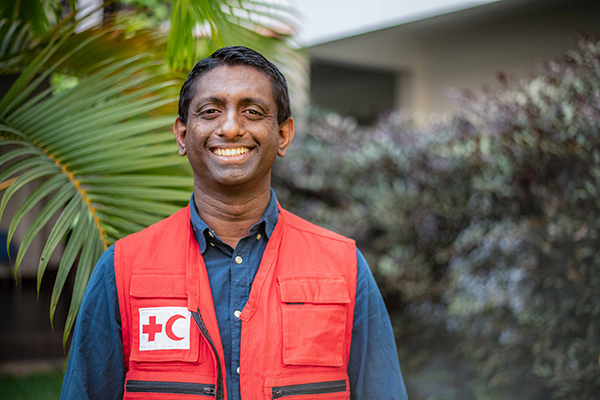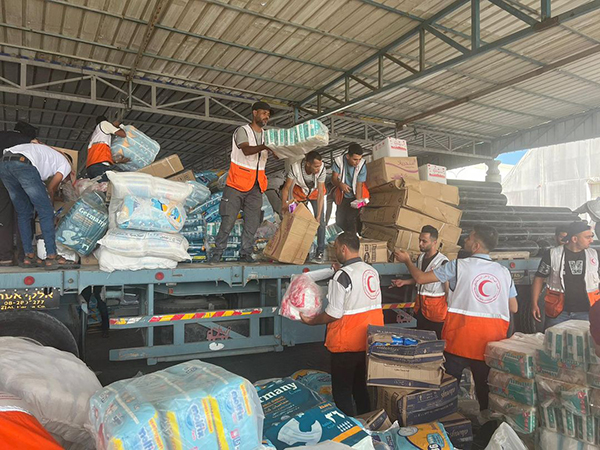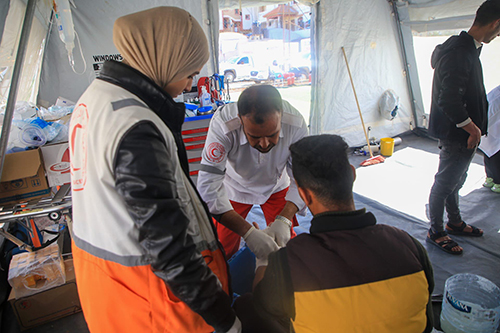Humanitarian crisis in Gaza: Rapid response worker provides emergency relief on a community scale
Working for the Canadian Red Cross as a rapid response manager in disasters and conflicts, Chiran Livera has seen large-scale crises unfold in countries around the world, as well as at home in Canada.
The situation in the Gaza Strip and West Bank is unlike anything that Livera, who recently returned from the region, has ever seen. He says the effort to provide humanitarian assistance to the affected population there, supported by Global Affairs Canada, has been protracted, complex and traumatic for those in the field.

Credit: Corrie Butler, IFRC
“I have responded to some of the largest emergencies in the world, and this one impacted me differently,” says Livera, head of emergency operations with the organization, based in Halifax. With GAC’s support, he spent 2 months in Ramallah assisting the Palestine Red Crescent Society in the emergency operation, with volunteers performing food distributions, organizing ambulances to transport the injured and coordinating humanitarian assistance.
Livera, 40, was born in Sri Lanka and at the age of 10 came to Canada when his family fled the civil war there and settled in Coquitlam, B.C. He began volunteering with the Red Cross in high school, helping people affected by flooding in the community. While at university, he was involved in large wildfire responses in northern Manitoba and Ontario, organizing relief distributions. This turned into a career with the Red Cross, including stints overseas, starting with the response to the 2004 Indian Ocean earthquake and tsunami, which involved Sri Lanka. These were followed by events such as the Haiti earthquake, the Ebola crisis in Africa and the mass migration in Syria.
Adding dignity to lives
Recalling his early days in Coquitlam, “when I support colleagues in places such as Gaza, I think about the local community there,” Livera says. “I'm an outsider; how can I work with them in their capacity, what value can I add?”
In Gaza, this meant helping the Palestine Red Crescent Society organize life-saving water and sanitation activities, including distributing hygiene kits provided by the Government of Canada. “While we are saving lives, it’s also important to help maintain the dignity of people. Soap, feminine hygiene products and similar items are invaluable in doing this, but there are no places for people to buy them.”

Credit: Palestine Red Crescent Society
Most emergencies, such as forest fires, earthquakes and hurricanes, start with an “acute phase” that can last a few days, he says, whereas in Gaza, “the acute phase has been months and months now.” Livera feels there are “many impediments” to delivering humanitarian assistance on the scale that’s needed. “This is not a traditional type of emergency operation, where we can set up airplanes and trucks and ships and bring items and then organize warehouses and distribute them.” Multiple approvals have to be obtained before shipments can be brought in, “and then we need to organize a systematic way of distributing items, so it’s not chaotic and the people with the most urgent needs can get them.”
The safety of those working in the field is a major concern, he says, with 22 Red Cross Red Crescent staff and volunteers from both the Palestine Red Crescent Society and Magen David Adom in Israel killed since the crisis began. Meanwhile, everyone on the Gaza teams is displaced, living in temporary shelters or staying at ambulance bases, called help posts, which he says are not made for sleeping.
“There is a lot of trauma—and this is a word I would use very carefully—in this response,” he says. “Working in a traumatized environment is very challenging, especially when you don’t have the opportunity to decompress for months, to talk about it, to get the psychosocial support that we provide to our staff, to get a break.”

Credit: Palestine Red Crescent Society
“A very small act in an ocean of needs”
When communicating by radio with volunteers out in the community, “we would just stop so our colleagues could cry and release the emotions that they were going through. And then we would talk about what they should do next.”
The situation grew more dire each day Livera was there. The hygiene kits from Canada represented a very small act in an ocean of needs,” he says, but it made a difference to him when his colleagues told him they had been distributed. “That connection goes all the way back to Canada,” he says, noting the similarity to the work done at home when there are wildfires. “Whether in Nova Scotia or in Gaza, it’s the local volunteers that are doing the distribution, it’s their community.”
Now that he’s back home, Livera is busy preparing his teams for the coming forest fire season, which is expected to be severe. “We have to be ready to respond as the needs come.”
He does this work at home and abroad for the same reason he first became involved in relief activities when his neighbours’ homes were flooded. “I could do much more than be a bystander; I could make a difference in somebody’s life,” Livera recalls. “Like many Canadians, I have a difficult time watching the news and seeing the many crises around the world. I want to do something to assist at a very human level.”
In the coming months Livera expects to return to the region, where “it’s really hard to maintain hope that tomorrow will be different—or next week or next month,” he says. “But until there’s a solution to the crisis, there are urgent humanitarian needs that need to be addressed.”
His experience in other conflict situations is that “once the fighting stops, we will know the full extent of the damage, what the needs are and how to think about rebuilding livelihoods and lives and homes.” Organizations like his are now planning how to regroup for that moment, Livera adds. “We will have to provide large-scale assistance that I don’t think we have seen in a very long time.”
- Date modified:
